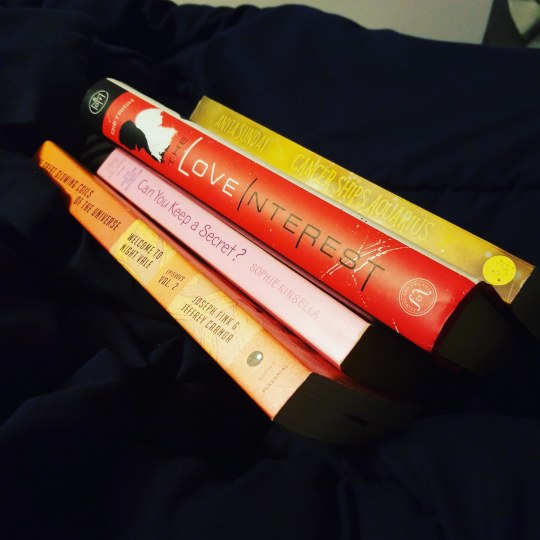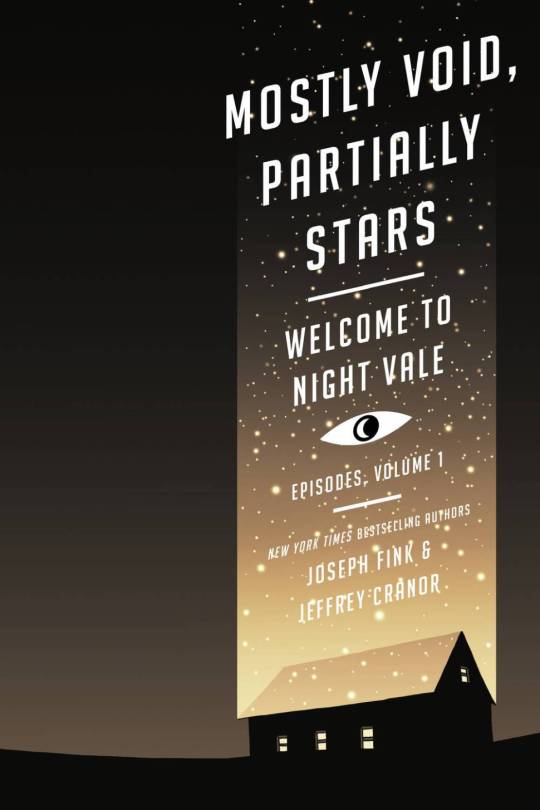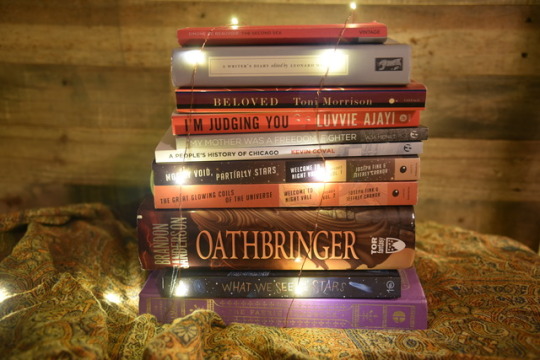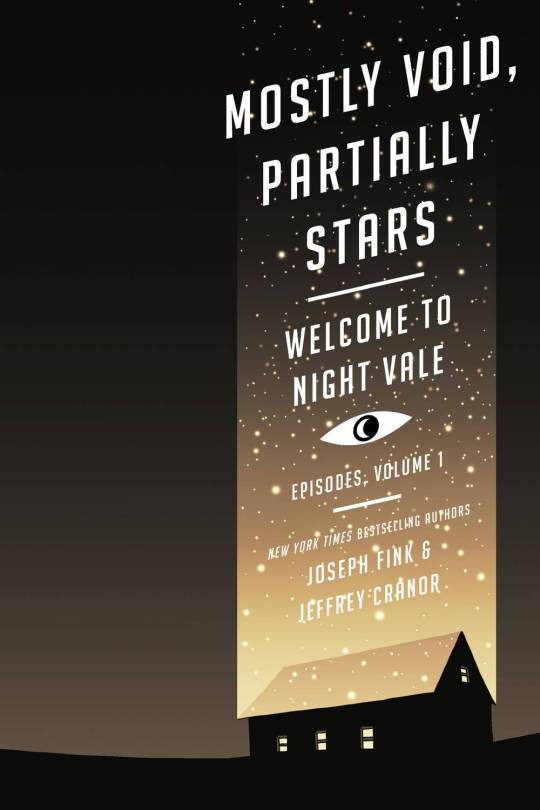#The Great Glowing Coils of the Universe (Welcome to Night Vale Episodes 2)
Text
“Are we living a life that is safe from harm? Of course not. We never are. But that’s not the right question. The question is: Are we living a life that is worth the harm?”
Joseph Fink, The Great Glowing Coils of the Universe (Welcome to Night Vale Episodes #2)
#wehavewords#joseph fink#The Great Glowing Coils of the Universe (Welcome to Night Vale Episodes 2)#Welcome to Night Vale#words#quotes#life quotes#life#quotes about life#true words#book inspiration#wtnv#wtnv quotes#favorite quotes#tv show quotes#tv quotes
226 notes
·
View notes
Photo

Monthly Reads: March 2020
The Great Glowing Coils of the Universe (Welcome to Night Vale Episodes, #2) by Joseph Fink and Jeffrey Cranor ★★★
Medea the Enchantress (Goddess Girls, #23) by Joan Holub and Suzanne Williams ★★★ [not pictured]
Can You Keep a Secret? by Sophie Kinsella ★★★★
The Love Interest by Cale Dietrich ★★★★
Cancer Ships Aquarius (Signs of Love, #5) by Anyta Sunday ★★★★
2 notes
·
View notes
Text
#2yrsago Welcome to Night Vale: scripts and notes from podcasting's eeriest drama

First, the amazing, creepy, weird and lovable podcast Welcome to Night Vale spawned a wonderful, improbable novel, and now, for book lovers who love Night Vale, there's two books of scripts and notes from the production team: Mostly Void, Partially Stars: Welcome to Night Vale Episodes, Volume 1 and The Great Glowing Coils of the Universe: Welcome to Night Vale Episodes, Volume 2 (I wrote the introduction to volume 1!).
The new Night Vale books are filled with amazing, insightful forematter and marginalia, the story of each episode annotated by the writers, actors and production crew.
I was privileged to write the introduction to the first volume (Maureen Johnson wrote the intro to book two), and the folks at Harpercollins and Night Vale have kindly given permission for me to reprint it here.
Being weird and funny is easy. Being weird and funny and compelling is
hard.
We've all guffawed as some strange, surreal juxtaposition ("Two. One to hold the giraffe and the other to fill the bathtub with brightly colored machine tools"). You don't have to be stoned to crack up at a friend's
fantastic, perfect non-sequitur. Stories that inspire hilarity and
mystification are good fun, but they're not great stories.
Stories become great by hacking your brain. Nothing that happens in
fiction matters. The people in fiction are fictional so their
triumphs and tragedies have literally no consequence. The death of the
yogurt you doomed to a fiery death in your gut-acid this morning is
infinitely more tragic than the "deaths" of Romeo and Juliette. The
yogurt was a alive and then it died. Romeo and Juliette never lived in
the first place.
Stories trick your naive, empathic mind into resonating in sympathy
(literally) with the plight of their imaginary people. Usually they do
this by scrupulously avoiding any reminder that these are imaginary
people. That "willing suspension of disbelief" is a bargain between the
creator and the audience: the creator tells the tale and hews to
something that is plausible (or at least consistent) and the audience
member doesn't pinch herself and say, "Cut it out with the quickened
heart, the leaking tears, the smiles of triumph, you dope, this is all
made up!"
This makes weird stories and great stories nearly incompatible. A story
is a love affair on the last night of summer camp that depends on both
parties not calling attention to the fact that the camp bus is coming in
the morning, so they can pretend that the night could last forever.
Weird stuff happening to the characters is a reminder that this is all
made up, the ending is coming, and when it's done, these invisible
people will disappear into the nonspace whence they came, so stop
cheering them on or crying for them.
Bringing me to Night Vale.
The remarkable thing about the people of Night Vale isn't how delightfully weird they
are. The remarkable thing is how moving they are. Cranor and Fink and
co-writers and actors weave a world with haphazard internal consistency.
When things are weird, they make them weirder. It's a good, meaty sort
of weird, steering clear of cliche and venturing into fresh, imaginative
territory -- but it's still undeniably weird.
It shouldn't work. We shouldn't root for Cecil, cheer on his love affair
with Carlos. Tamika Flynn and Intern Dana and even that guy with the
deerskin suitcase full of flies (whose story was so beautifully told in
the first Night Vale novel, a book that is, if anything even more
improbable than these podcast scripts) -- they live through ridiculous
events but they react to them with perfect aplomb. They manage to trip
the empathic response that makes us care about their outcomes, despite
their outlandish lives.
This shouldn't work. In theory, it shouldn't work. Like Wikipedia and
many other marvels of the Internet age, Welcome to Night Vale only works
in practice. In theory, it's a disaster.
I don't know how the Night Vale writers pull this off. I suspect they
may be witches. I got some clues from reading the Night Vale
novel in which I learned that in the writers' heads, these characters
have completely credible internal lives that treat their weird lives as
real. Somehow, though those internal lives usually stay internal in the
podcast (the difference between drama and prose is that in drama, you
only get what people say and do; in prose, you get what's going on
inside their heads), they shine through the characters and their voices,
ensnaring our empathy.
The creators' notes you're about to read give a hint at how this alchemy
takes place. Usually reading how writers write (or even how actors act)
is like listening to stranger tell you about their boring dreams. Fink,
Cranor, and their collaborators make the stories behind these stories
fascinating, in part because of the light they shed on this most bizarre
phenomenon.
In short, there's moving stories, there's weird stories, and then,
there's Night Vale. It's weirdly moving. Be prepared. Be mystified. Be
delighted. Please don't burn the authors at the stake for their sorcery,
no matter how tempting it may be.
-Cory Doctorow, Los Angeles, 2016
Mostly Void, Partially Stars: Welcome to Night Vale Episodes, Volume 1 [Joseph Fink and Jeffrey Cranor, foreword by Maureen Johnson/Harpercollins]
The Great Glowing Coils of the Universe: Welcome to Night Vale Episodes, Volume 2 [Joseph Fink and Jeffrey Cranor, foreword by Cory Doctorow/Harpercollins]
https://boingboing.net/2016/09/15/welcome-to-night-vale-scripts.html
8 notes
·
View notes
Text
2017 TBR Tag
Thank you for tagging me, @readingthegenjiinkolkata! I’m supposed to post here all of the books that I’m hoping to read this year. It’s a long list—I’m being ambitious, particularly because I’m still trying to make my 150 book goal for 2017 after dedicating two whole weeks to reading a 1,200 ARC at the beginning of November. But I do have this list all written up!
I’m supposed to read 15 more books by the end of the year, not including the two I’m currently reading—A Writer’s Diary by Virginia Woolf and The Great Glowing Coils of the Universe (Welcome to Night Vale Episodes #2). I’m also trying to quickly fit in some of my resolutions such as reading more non-fiction by getting a couple of my main ones I bought this year out of the way, and I’ve added some hardcover YA to my list.
Atlas of Lost Cities by Aude de Tocqueville
No One Cares About Crazy People by Ron Powers
Land of Love and Drowning by Tiphanie Yanique
We Are Okay by Nina LaCour
If We Were Villains by M.L. Rio
The Lonely City: Adventures in the Art of Being Alone by Olivia Laing
Sula by Toni Morrison
We Are Never Meeting in Real Life by Samantha Irby
Women, Race, and Class by Angela L. Davis
A Farewell to Arms by Ernest Hemingway
Beasts Made of Night by Tochi Onyebuchi
Like Water by Rebecca Podos
The Colour of Magic by Terry Pratchett
We Have Always Lived in the Castle by Shirley Jackson
One spot reserved for an ARC or for a book I get for the holidays!
4 notes
·
View notes
Text
“May we all be human: beautiful, stupid, temporal, endless. And as the sun sets, I place my hand upon my heart, feel that it is still beating, and remind myself: "Past performance is not a predictor of future results.”
Joseph Fink, The Great Glowing Coils of the Universe (Welcome to Night Vale Episodes, #2)
#wehavewords#joseph fink#The Great Glowing Coils of the Universe (Welcome to Night Vale Episodes 2)#Welcome to Night Vale#words#quotes#life quotes#life#quotes about life#true words#wtnv#wtnv quotes#tv show quotes#tv quotes#self care#book inspiration
41 notes
·
View notes
Text
“At your smallest components, you are indistinguishable from a forest fire.”
Joseph Fink, The Great Glowing Coils of the Universe (Welcome to Night Vale Episodes, #2)
#wehavewords#joseph fink#The Great Glowing Coils of the Universe (Welcome to Night Vale Episodes 2)#Welcome to Night Vale#words#quotes#life quotes#life#quotes about life#true words#wtnv quotes#wtnv#tv show quotes#tv quotes#fire quotes
51 notes
·
View notes
Text
“Be proud of your place in the cosmos. It is so small. And yet it is.”
Joseph Fink, The Great Glowing Coils of the Universe (Welcome to Night Vale Episodes #2)
#wehavewords#joseph fink#The Great Glowing Coils of the Universe (Welcome to Night Vale Episodes 2)#Welcome to Night Vale#words#quotes#life quotes#life#quotes about life#true words#book inspiration#tv show quotes#tv quotes#wtnv#wtnv quotes#self importance#self care
16 notes
·
View notes
Text
“We wake up. We move on. No state is our state forever. All is fleeting.”
Joseph Fink, The Great Glowing Coils of the Universe (Welcome to Night Vale Episodes #2)
#wehavewords#joseph fink#The Great Glowing Coils of the Universe (Welcome to Night Vale Episodes 2)#Welcome to Night Vale#words#quotes#life quotes#life#quotes about life#true words#tv show quotes#tv quotes#wtnv#wtnv quotes
8 notes
·
View notes
Text
“All the beauty in the world was made within the oppressive limitations of time and death and impermanence.”
Joseph Fink, The Great Glowing Coils of the Universe (Welcome to Night Vale Episodes #2)
#wehavewords#joseph fink#The Great Glowing Coils of the Universe (Welcome to Night Vale Episodes 2)#Welcome to Night Vale#wtnv#wtnv quotes#words#quotes#life quotes#life#quotes about life#true words#favorite quotes#book inspiration#beauty#quotes about the world#world#death#quotes about death
6 notes
·
View notes
Photo

November Wrap-Up
It was all-around a lovely month of reading, half speed-reads and half books that I had to really bury myself into. The highlight of the month was a book that I believe is making real change in my life, A Writer’s Diary, which is made up of extracts on writing, reading, and mental health from Virginia Woolf’s diaries. Other highlights include the creepy joys of the Welcome to Night Vale episode compilations, the classic Beloved by Toni Morrison, and the gorgeous The Faerie Handbook, which I’m giving away on Instagram. Now I only have to read 15 total books in the month of December to read my 2017 goal of 150!
✨Extracts from The Second Sex by Simone de Beauvoir
✨A Writer’s Diary by Virginia Woolf
✨Beloved by Toni Morrison
✨I’m Judging You by Luvvie Ajayi
✨My Mother Was a Freedom Fighter by Aja Monet
✨A People’s History of Chicago by Kevin Coval
✨Mostly Void, Partially Stars (Welcome to Night Vale episodes #1) by Joseph Fink and Jeffrey Cranor
✨The Great Glowing Coils of the Universe (Welcome to Night Vale episodes #2) by Joseph Fink and Jeffrey Cranor
✨Oathbringer (The Stormlight Archive #3) by Brandon Sanderson
✨What We See in the Stars: An Illustrated Tour of the Night Sky by Kelsey Oseid
✨The Faerie Handbook: An Enchanting Compendium of Literature, Lore, Art, Recipes, and Projects edited by Carolyn Turgeon
3 notes
·
View notes
Text
Welcome to Night Vale: scripts and notes from podcasting's eeriest drama #1yrago


First, the amazing, creepy, weird and lovable podcast Welcome to Night Vale spawned a wonderful, improbable novel, and now, for book lovers who love Night Vale, there's two books of scripts and notes from the production team: Mostly Void, Partially Stars: Welcome to Night Vale Episodes, Volume 1 and The Great Glowing Coils of the Universe: Welcome to Night Vale Episodes, Volume 2 (I wrote the introduction to volume 1!).
The new Night Vale books are filled with amazing, insightful forematter and marginalia, the story of each episode annotated by the writers, actors and production crew.
I was privileged to write the introduction to the first volume (Maureen Johnson wrote the intro to book two), and the folks at Harpercollins and Night Vale have kindly given permission for me to reprint it here.
Being weird and funny is easy. Being weird and funny and compelling is hard.
We've all guffawed as some strange, surreal juxtaposition ("Two. One to hold the giraffe and the other to fill the bathtub with brightly colored machine tools"). You don't have to be stoned to crack up at a friend's fantastic, perfect non-sequitur. Stories that inspire hilarity and mystification are good fun, but they're not great stories.
Stories become great by hacking your brain. Nothing that happens in fiction matters. The people in fiction are fictional so their triumphs and tragedies have literally no consequence. The death of the yogurt you doomed to a fiery death in your gut-acid this morning is infinitely more tragic than the "deaths" of Romeo and Juliette. The yogurt was a alive and then it died. Romeo and Juliette never lived in the first place.
Stories trick your naive, empathic mind into resonating in sympathy (literally) with the plight of their imaginary people. Usually they do this by scrupulously avoiding any reminder that these are imaginary people. That "willing suspension of disbelief" is a bargain between the creator and the audience: the creator tells the tale and hews to something that is plausible (or at least consistent) and the audience member doesn't pinch herself and say, "Cut it out with the quickened heart, the leaking tears, the smiles of triumph, you dope, this is all made up!"
This makes weird stories and great stories nearly incompatible. A story is a love affair on the last night of summer camp that depends on both parties not calling attention to the fact that the camp bus is coming in the morning, so they can pretend that the night could last forever. Weird stuff happening to the characters is a reminder that this is all made up, the ending is coming, and when it's done, these invisible people will disappear into the nonspace whence they came, so stop cheering them on or crying for them.
Bringing me to Night Vale.
The remarkable thing about the people of Night Vale isn't how delightfully weird they are. The remarkable thing is how moving they are. Cranor and Fink and co-writers and actors weave a world with haphazard internal consistency. When things are weird, they make them weirder. It's a good, meaty sort of weird, steering clear of cliche and venturing into fresh, imaginative territory -- but it's still undeniably weird.
It shouldn't work. We shouldn't root for Cecil, cheer on his love affair with Carlos. Tamika Flynn and Intern Dana and even that guy with the deerskin suitcase full of flies (whose story was so beautifully told in the first Night Vale novel, a book that is, if anything even more improbable than these podcast scripts) -- they live through ridiculous events but they react to them with perfect aplomb. They manage to trip the empathic response that makes us care about their outcomes, despite their outlandish lives.
This shouldn't work. In theory, it shouldn't work. Like Wikipedia and many other marvels of the Internet age, Welcome to Night Vale only works in practice. In theory, it's a disaster.
I don't know how the Night Vale writers pull this off. I suspect they may be witches. I got some clues from reading the Night Vale novel in which I learned that in the writers' heads, these characters have completely credible internal lives that treat their weird lives as real. Somehow, though those internal lives usually stay internal in the podcast (the difference between drama and prose is that in drama, you only get what people say and do; in prose, you get what's going on inside their heads), they shine through the characters and their voices, ensnaring our empathy.
The creators' notes you're about to read give a hint at how this alchemy takes place. Usually reading how writers write (or even how actors act) is like listening to stranger tell you about their boring dreams. Fink, Cranor, and their collaborators make the stories behind these stories fascinating, in part because of the light they shed on this most bizarre phenomenon.
In short, there's moving stories, there's weird stories, and then, there's Night Vale. It's weirdly moving. Be prepared. Be mystified. Be delighted. Please don't burn the authors at the stake for their sorcery, no matter how tempting it may be.
-Cory Doctorow, Los Angeles, 2016
Mostly Void, Partially Stars: Welcome to Night Vale Episodes, Volume 1[Joseph Fink and Jeffrey Cranor, foreword by Maureen Johnson/Harpercollins]
The Great Glowing Coils of the Universe: Welcome to Night Vale Episodes, Volume 2 [Joseph Fink and Jeffrey Cranor, foreword by Cory Doctorow/Harpercollins]
https://boingboing.net/2016/09/15/welcome-to-night-vale-scripts.html
15 notes
·
View notes
Text
Welcome to Night Vale: scripts and notes from podcasting's eeriest drama #1yrago

First, the amazing, creepy, weird and lovable podcast Welcome to Night Vale spawned a wonderful, improbable novel, and now, for book lovers who love Night Vale, there's two books of scripts and notes from the production team: Mostly Void, Partially Stars: Welcome to Night Vale Episodes, Volume 1 and The Great Glowing Coils of the Universe: Welcome to Night Vale Episodes, Volume 2 (I wrote the introduction to volume 1!).
The new Night Vale books are filled with amazing, insightful forematter and marginalia, the story of each episode annotated by the writers, actors and production crew.
I was privileged to write the introduction to the first volume (Maureen Johnson wrote the intro to book two), and the folks at Harpercollins and Night Vale have kindly given permission for me to reprint it here.
Being weird and funny is easy. Being weird and funny and compelling is hard.
We've all guffawed as some strange, surreal juxtaposition ("Two. One to hold the giraffe and the other to fill the bathtub with brightly colored machine tools"). You don't have to be stoned to crack up at a friend's fantastic, perfect non-sequitur. Stories that inspire hilarity and mystification are good fun, but they're not great stories.
Stories become great by hacking your brain. Nothing that happens in fiction matters. The people in fiction are fictional so their triumphs and tragedies have literally no consequence. The death of the yogurt you doomed to a fiery death in your gut-acid this morning is infinitely more tragic than the "deaths" of Romeo and Juliette. The yogurt was a alive and then it died. Romeo and Juliette never lived in the first place.
Stories trick your naive, empathic mind into resonating in sympathy (literally) with the plight of their imaginary people. Usually they do this by scrupulously avoiding any reminder that these are imaginary people. That "willing suspension of disbelief" is a bargain between the creator and the audience: the creator tells the tale and hews to something that is plausible (or at least consistent) and the audience member doesn't pinch herself and say, "Cut it out with the quickened heart, the leaking tears, the smiles of triumph, you dope, this is all made up!"
This makes weird stories and great stories nearly incompatible. A story is a love affair on the last night of summer camp that depends on both parties not calling attention to the fact that the camp bus is coming in the morning, so they can pretend that the night could last forever. Weird stuff happening to the characters is a reminder that this is all made up, the ending is coming, and when it's done, these invisible people will disappear into the nonspace whence they came, so stop cheering them on or crying for them.
Bringing me to Night Vale.
The remarkable thing about the people of Night Vale isn't how delightfully weird they are. The remarkable thing is how moving they are. Cranor and Fink and co-writers and actors weave a world with haphazard internal consistency. When things are weird, they make them weirder. It's a good, meaty sort of weird, steering clear of cliche and venturing into fresh, imaginative territory -- but it's still undeniably weird.
It shouldn't work. We shouldn't root for Cecil, cheer on his love affair with Carlos. Tamika Flynn and Intern Dana and even that guy with the deerskin suitcase full of flies (whose story was so beautifully told in the first Night Vale novel, a book that is, if anything even more improbable than these podcast scripts) -- they live through ridiculous events but they react to them with perfect aplomb. They manage to trip the empathic response that makes us care about their outcomes, despite their outlandish lives.
This shouldn't work. In theory, it shouldn't work. Like Wikipedia and many other marvels of the Internet age, Welcome to Night Vale only works in practice. In theory, it's a disaster.
I don't know how the Night Vale writers pull this off. I suspect they may be witches. I got some clues from reading the Night Vale novel in which I learned that in the writers' heads, these characters have completely credible internal lives that treat their weird lives as real. Somehow, though those internal lives usually stay internal in the podcast (the difference between drama and prose is that in drama, you only get what people say and do; in prose, you get what's going on inside their heads), they shine through the characters and their voices, ensnaring our empathy.
The creators' notes you're about to read give a hint at how this alchemy takes place. Usually reading how writers write (or even how actors act) is like listening to stranger tell you about their boring dreams. Fink, Cranor, and their collaborators make the stories behind these stories fascinating, in part because of the light they shed on this most bizarre phenomenon.
In short, there's moving stories, there's weird stories, and then, there's Night Vale. It's weirdly moving. Be prepared. Be mystified. Be delighted. Please don't burn the authors at the stake for their sorcery, no matter how tempting it may be.
-Cory Doctorow, Los Angeles, 2016
Mostly Void, Partially Stars: Welcome to Night Vale Episodes, Volume 1[Joseph Fink and Jeffrey Cranor, foreword by Maureen Johnson/Harpercollins]
The Great Glowing Coils of the Universe: Welcome to Night Vale Episodes, Volume 2 [Joseph Fink and Jeffrey Cranor, foreword by Cory Doctorow/Harpercollins]
https://boingboing.net/2016/09/15/welcome-to-night-vale-scripts.html
9 notes
·
View notes